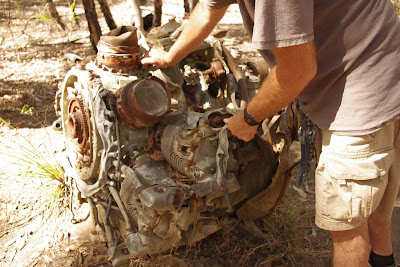I had picked up a book about Fraser Island at a thrift shore a few days earlier and spent some time in the morning reading through it to help us plan our excursion. As I perused the book two things struck me; driving on the sandy beaches and through saline water meant that your 4 WD was going to be sprayed with salt water in most of its nooks and crannies, and that after leaving the island a thorough cleaning was required to keep the car from rusting in all the wrong places. Having lived in Ohio my whole life, I know what salt can do to a car. Not because of our wonderful ocean beaches of course, but because road crews start covering the roads with salt as soon as there's a threat of slippery conditions. There are car wash places near the island that promise a thorough cleansing of your car after you leave the island, so I suppose that would probably do.
But as our time compressed and we kept crossing places off our list to make time to see the big sand island, and I read about the miles of sandy beach and sand ponds and coastal vegetation, and then looked at photos of shoreline fairly crowded with Land Rovers and Land Cruisers and Jeeps, I realized that it just might not be worth the ferry fees and permits and jockeying for solitude and tire deflating and inflating and all the rest. Skipping Fraser Island would give us us three more days to see a variety of sights and experiences that went beyond a few days of sand between our toes. I talked to Diana, showed her the pictures in the book and we both agreed. Scratch.
So instead, we drove up to Kroombit Tops National Park. The main reason for going was to see a B-24 Liberator bomber that crashed there in 1942 but was only discovered in 1994. It took most of the day to get there and back, but we saw some interesting countryside, I got to drive some challenging steep and rocky 4 WD roads, and walking around the wreck and contemplating the last days of the men who died there was quite moving. It turned out to be one of the more important and memorable experiences of our trip.
 |
| The area around the park is mostly forested and is cattle country. |
 |
| Stockmen run a few different breeds up here |
 |
| Smaller holdings have been consolidated into larger stations |
 |
| This classic house has been abandoned in favor of more modern abode |
 |
| It's nice when they pose for you |
Once there we hiked into the forest a few hundred meters to arrive at the actual wreckage.
 |
| The bomber, "Beautiful Betsy", had been retired from fighting duties because of damage sustained in battle... |
 |
| The plane left Darwin on a run to Brisbane in bad weather on Feb. 26, 1942, and was never heard from again... |
 |
| Upon impact the bomber flipped over, leaving the tail section and wings relatively intact |
 |
| However, the fuselage was smashed nearly beyond recognition ... |
 |
| ... and the four massive radial engines were carried further up the hill by the forward momentum of the plane ... |
 |
| ... with thousands of bits and pieces scattered in between. |
 |
| The propellers ended up the furthest from the crash site. They probably broke off their shafts while still spinning and cartwheeled through the forest. |
After looking around the site, we left in late afternoon and drove back down off the mountain. We wanted to get to the small town of Miriam Vale where our guidebook promised mudcrab sandwiches. We had missed out on the tantalizingly yet unappealingly named seafood in Townsville and didn't want to leave Queensland before sampling it. Miriam Vale had a couple cute little cafes but none offered mudcrab, so we ended up at the Crab Shack, a gas station/gift shop/restaurant out at the main road. They had the crabmeat sandwiches, and we ordered two.
What we got was plain white bread thickly buttered on both pieces, with bits of unadorned crab meat layered in between. Wow, was it unimpressive! A little tartar or cocktail or horseradish sauce, or maybe mayo, or even a little ketchup would have helped. It didn't taste bad, just sort of plain. This was the famous Mudcrab Sandwich we'd read about, both in our guidebooks and on various signs and placards along the coastal road?
We made it to a free rest area for the night and had some red wine and Tim Tams before going to bed, salvaging the evening's culinary disappointment, but satisfied by the day's travel that we had made the right decision in changing our plans.
What we got was plain white bread thickly buttered on both pieces, with bits of unadorned crab meat layered in between. Wow, was it unimpressive! A little tartar or cocktail or horseradish sauce, or maybe mayo, or even a little ketchup would have helped. It didn't taste bad, just sort of plain. This was the famous Mudcrab Sandwich we'd read about, both in our guidebooks and on various signs and placards along the coastal road?
We made it to a free rest area for the night and had some red wine and Tim Tams before going to bed, salvaging the evening's culinary disappointment, but satisfied by the day's travel that we had made the right decision in changing our plans.






No comments:
Post a Comment